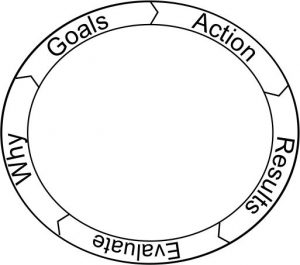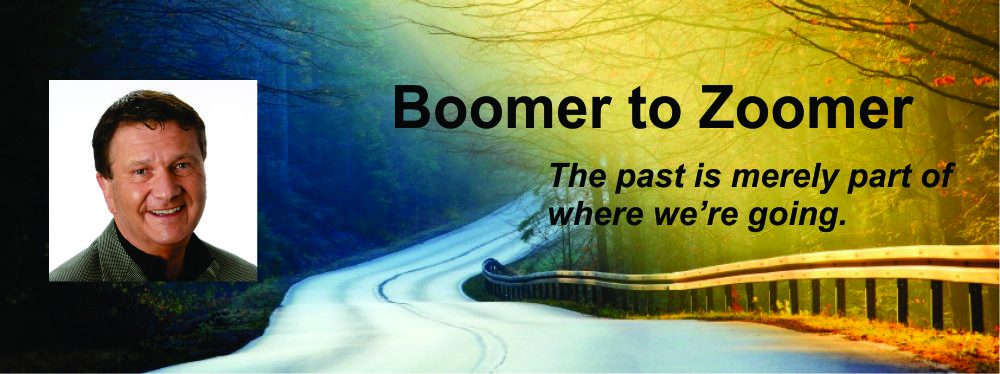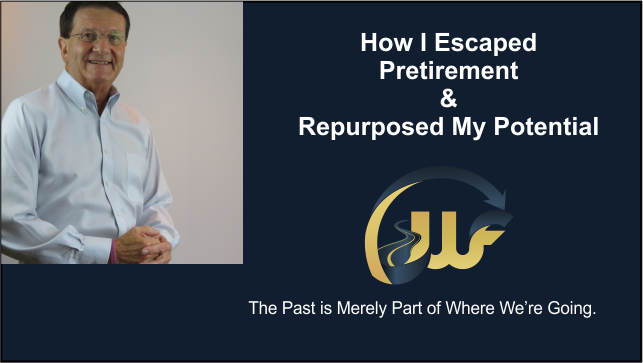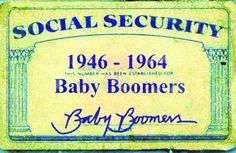Job Hunting for Young Adults
Five hacks to make the most money.
Using:
Kindergarten Circles and Third-grade Math.
I want to talk to you about the most important job you will ever have in your life, You Inc.
- How many of you think you work for yourself? Either you will work for your goals, or you will work for somebody else’s goals.
- How many of you think you are in sales? How many want to drive your parent’s car? How many of you want your own car? How many want to stay out later than your parents allow? How many have ever asked for a date? Then you are in sales. Sales is the transfer of your belief in yourself to someone else.
- By working for You Inc, you are the product. You are the president. You decide on the business plan for your success. You decide on the job description. You decide on the bonuses.
I want you to treat goal achievement like your most important job in your life and take it seriously.
The reason I know that these will help you earn more income and have a happier supervisor or boss is because I had to learn these hacks on my own in high school and used them to reach my goals. I was forced to develop these because I started in the half of the class that made the top half possible. Even if you are not now, you can still finish high school in the top 10% by applying these simple techniques and hacks.
Dreams without goals are simply wishes. It is the burning desire that changes a wish into a goal. As a teenager, I didn’t want to be in a classroom. I wanted practical knowledge that would earn money. Money meant freedom to me. Freedom meant that I could come and go as I pleased. It meant owning a car. It meant I did not have to ask my parents for money.
In my junior and senior year, I finished school each day at noon. I owned my car. I always had money in my pocket. I always had gas money to take my friends places in my car, so we could play see and be seen. I worked nights in a hospital that gave me three credits each year towards graduation and I got paid for it. You see, that was my dream and I achieved it through setting goals and developing the hacks to make my goals materialize.
Goals
Webster says a goal is: “the end result toward which effort is directed”
Most people have three top goals:
- Health goal – not to run longer, sleep less, but to look better, feel better, be lighter, have bigger muscles, to not have skin problems and to look good in clothes.
- Money goal – Most young adults want to earn enough to buy a car, have a new phone or a fashion watch, cool shoes, cool hair, money to flash on a date. I wanted to live on my own, without my parents, brothers and sisters.
- Relationship goal – Is your goal to have; a girlfriend, boyfriend, any friend, respect from others, your parents to express that they love you? Most teenagers often just wish someone would love them.
Action Circle
Keep goal achievement as simple as possible. It starts with drawing a kindergarten circle.

Action Circle: GAREW
Why are you doing what you want to do?
What are your Goals to reach your why?
What Action steps are you going to take?
What are the Results from your Actions?
Evaluate your Results to achieve your Why
To begin the process, break into the circle at the Why. What do you want tomorrow to look like when you wake up? What does your bedroom look like? Your bathroom? Your kitchen? Your car? Your house? Your yard? Your office? Your bank accounts? What are you wearing? Who are your friends? Your spouse?
The Trilogy of goal success.
Brian Tracy, best-selling author when it comes to goal achievement repeatedly writes that the trilogy of goal success is found in Clarity, Focus, and Concentration.
Here is why.
- You must take responsibility to make your own goals. No one knows enough about you to decide other than you. Only you can be clear on what you want.
- Remember the importance of words. Words are concepts. Clarity of concepts provides clarity of words. Words provide the clarity for focus and concentration.
- Clarity provides measurable results. What gets measured gets done and improved.
- Clarity helps you decide which of the 50,000 thoughts per day that go through your mind are the important ones.
- You have only so many attention units or bandwidth with which to deal with daily events. Clarity reduces stress of not knowing what to do next.
- Taking responsibility gives you focus on what needs to be done each day. You are the president of your own company: You Inc. The buck stops at you. You may hire yourself out to the highest bidder. If you want to earn more income, make yourself more valuable by offering better service. Learn more, learn faster, and make a lot of money.
- Once you have clarity and focus, concentrate on the next thing that needs to be done today and do not do anything else until that is complete. Either you achieve your own goals or you work for someone who has you achieving their goals.
The measurement of success is how well prepared to win you are, not your desire to win.
- Clear goals give you focus
Applying effort to an unclear goal is like aiming an arrow with your eyes closed. Even if you are prepared and apply the best effort the chances of hitting your target are very low if you do not have a clear target. It becomes pointless and uses up attention units for no results. You can have all the potential required and still end up frustrated.
- Clear goals are measurable
Happiness is the progressive realization of a worthwhile goal. To determine success, we need to measure the progress. How far away is the goal? How close are we to completion? Some goals are measured in dollars, some in time, some in a level of contentment. A journey of a thousand miles in twenty hours means going fifty miles an hour. Each hour means we are getting closer. If you had no watch or speedometer, you would have no idea if you had time to stop for fuel or food. So rather than panicking every minute, measure the time and distance to be prepared for all the things that life can throw at you to distract and disrupt your accomplishment. Having a measurement gives you options and choices.
3.Clear goals avoid distractions
It is called the shiny object syndrome. Have you ever seen a fishing show where they film the fish looking at a lure and about to strike when suddenly the fish is presented with another lure just slightly off in another direction? What happens is this fish stops and become indecisive. It does not know which one to go after. I once had an Army supervisor give me instructions on what he needed to have done. Shortly after I started, he returned to say stop working on that project and start working on this project, so I did. Several minutes later he came back in and gave instructions to work on a third project. I simply put down all the projects and waited. It wasn’t long before he returned with the newest instructions. He realized he had sown confusion and said, wait until I get clear directions and then I will be able to give you clear instructions. Once the goal was clarified, I could apply focus and concentration to complete the assignment in record time. Like the fish, my mind could not complete the tasks until it was clear from distractions of all the other things that could be done but were not the most important. Setting clear goals with focus gives you mental boundaries.
- Clear goals motivates to get started now
When you look at two tasks, your mind will automatically be attracted to the one that looks easiest. When all the ducks are in a row it takes less effort to start. Less effort means easier to get started, which means less procrastination. So, the task for the goal that is clear and in focus, will get started sooner. Clear goals defeat procrastination. Goals need to have a daily “most important think”. In other words, what you think about gets done. When you have a daily “MIT”, it is more enjoyable and you finish faster, and, have a better feeling for your accomplishment. Each accomplishment builds higher self-esteem and leads to more tasks being completed in a day. Use the affirmation: What’s the best use of my time, right now?
- Clear goals supply the force for motivation
All goals need to be tied to reasons. Without a reason, you are in for a season, some say. The results of your action on a goal need to be measured against the reason, or objective, or value that you want to achieve. A game needs a goal post. That post in life are the values you hold most dear to your mind and heart. The reason provides the motivation. It is the discipline that takes the effort.
Hack Exercises:
- What do you want? Exercise for students. What do you want? What do you really, really, want?
- Write down every single idea you have, no matter how big or small.
- Always carry a notebook.
- Find a list method that works for you. Doodles, bullet-points, charts, send yourself a text or email, record your thoughts, what suits you best?
- Make a list of small, manageable tasks to complete every day
- Mark off every completed task you’ll find making each tick very satisfying – The feel-good dopamine hormone is released every time you complete a task and check it off your list. Make it a habit of creating and checking off items on a list.
- Make your goals measurable so you know if your plans are working
- Set far off, outlandish goals. What do you want to have achieved by 2020? How about 2050?
- Include personal goals in your lists, not just business or career
- Share your goals only with others who can aid in your achievement. You can help inspire each other further. Do not share with those who ridicule or discount your goals. You have enough negative thoughts in your own head. You do not need any help criticizing your ambitions.
- Find positive role models – peers-plus. Find those who have done what you want to do and learn from their steps.
- Take Action!
- Any action! You just need an idea to act upon. A journey starts with a single step.
- Are you moving in the direction of your goal, or the opposite direction?
- Measure results
- Celebrate your successes then make new lists of new goals as you measure against what you wanted.
- Continue your education. Learn from what did not go the way you expected. Try another direction, rather than give up. Remember; goals in concrete, plans in sand.
- Set new goals
- What do you want to see from this job; training, advancement, stepping stone, leadership?
- Ask your boss for input as to how to provide the best service to them and the company, that is in alignment with your goals? Give them a report of what you have accomplished each week and ask for help in areas you think need improvement.
- Make sure all goals aline with your values and ideals.
If you have questions, leave a comment. I will respond.






